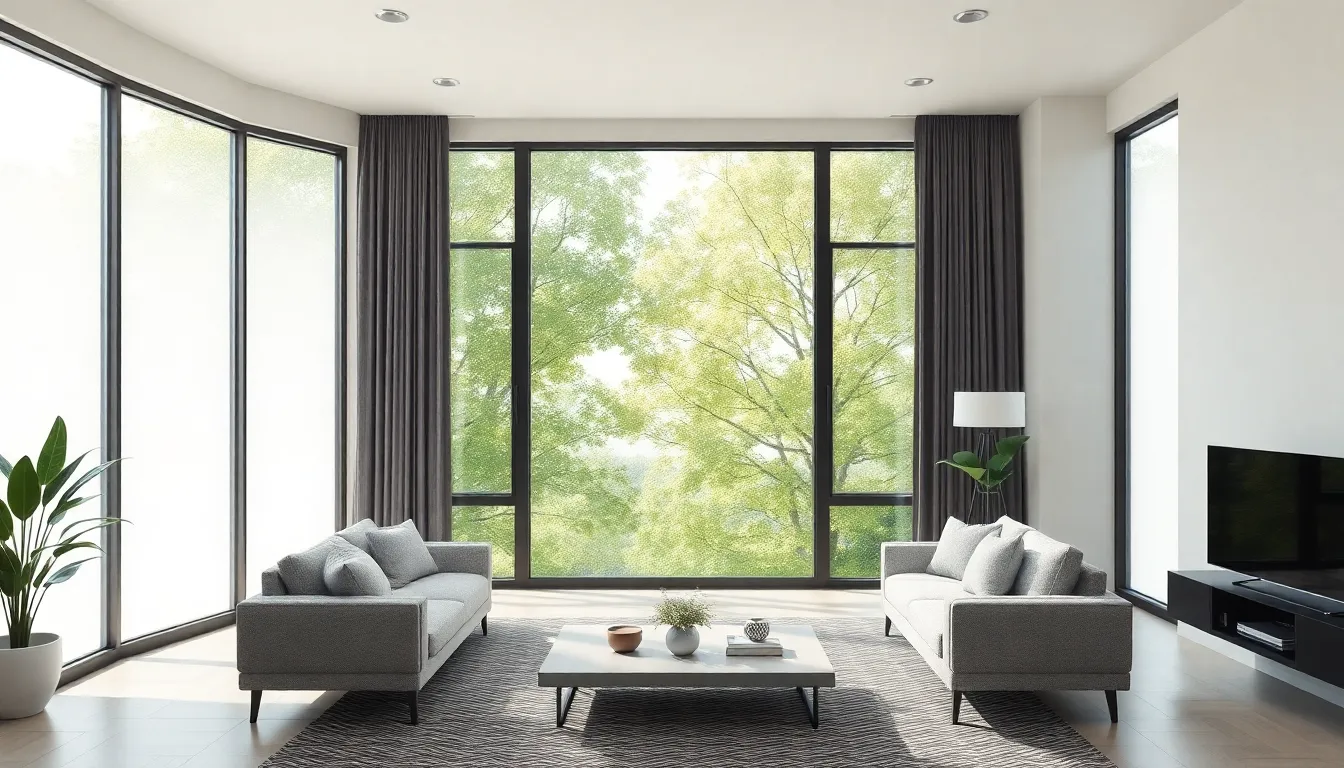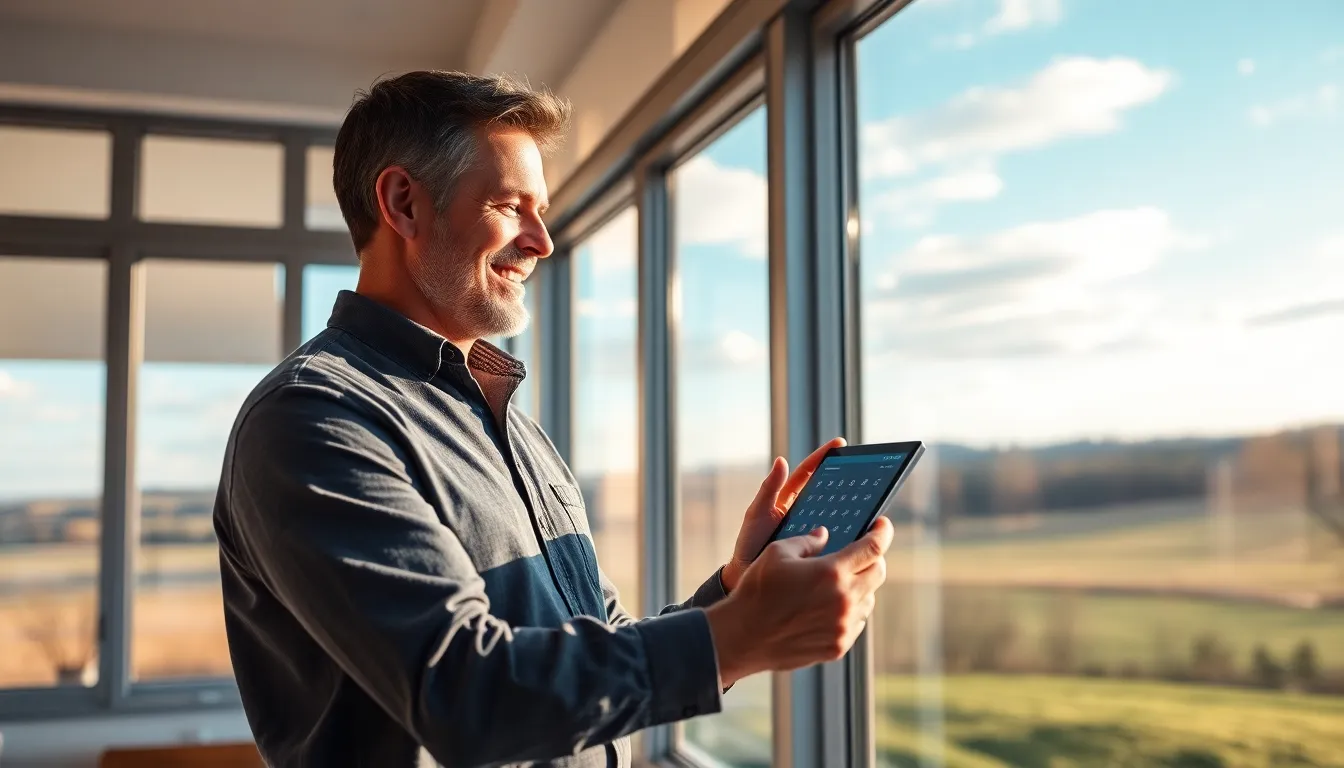Imagine a world where your windows do more than just let in light—where they adjust to the sun’s whims and keep your home cozy without breaking a sweat. Enter smart windows, the high-tech superheroes of home design. These innovative marvels not only enhance your home’s energy efficiency but also add a touch of futuristic flair that’ll have your neighbors green with envy.
Gone are the days of wrestling with blinds or sweating through summer heat. Smart windows adapt to changing weather conditions, giving you the perfect ambiance while slashing those energy bills. Whether it’s blocking harmful UV rays or maximizing natural light, these windows are like having a personal assistant for your home. So, why settle for ordinary when you can elevate your living space with a little smart technology?
Smart Windows for Homes
Smart windows represent a blend of technology and design, making homes more comfortable and energy-efficient. These windows adjust to varying light conditions, enhancing aesthetics while reducing reliance on conventional window coverings.
What Are Smart Windows?
Smart windows feature dynamic glazing technology that changes transparency based on external conditions. They can be categorized into two main types: electrochromic and photochromic. Electrochromic windows shift from transparent to opaque when an electrical current is applied, while photochromic windows darken or lighten in response to sunlight. These windows not only add modern aesthetics to homes but also offer significant energy savings by regulating indoor temperatures and reducing the need for heating or cooling systems.
How Do Smart Windows Work?
Smart windows operate through various technologies that respond to environmental factors. Sensors detect light intensity and temperature, adjusting the window’s tint accordingly. In electrochromic windows, a small electrical charge triggers the tint change, while photochromic windows react passively to UV radiation. These operational mechanisms allow homes to maintain optimal natural light levels throughout the day, supporting energy efficiency and enhancing occupant comfort. Smart windows contribute significantly to a greener lifestyle, promoting sustainability in residential design.
Benefits of Smart Windows for Homes

Smart windows offer numerous advantages for homeowners by integrating technology with design. These benefits promote comfort, efficiency, and style while enhancing overall living experiences.
Energy Efficiency
Smart windows enhance energy efficiency by regulating indoor temperatures. They reduce reliance on heating and cooling systems, resulting in lower energy bills. With the ability to automatically adjust tint, these windows minimize heat gain during summer months and retain warmth in winter. Energy savings can range from 15% to 30%, depending on climate and usage. By optimizing natural light, smart windows ensure effective use of daylight, further decreasing energy consumption.
Enhanced Comfort
Enhanced comfort is a significant benefit of smart windows. They maintain consistent indoor temperatures, eliminating hot or cold spots within a room. This feature contributes to a more enjoyable living space. Users can enjoy abundant natural light without glare due to smart windows’ adjustable tint properties. Automated adjustments create an ideal balance between sunlight and shade, promoting a pleasant atmosphere throughout the day. Overall, this technology increases occupant satisfaction in their homes.
Privacy and Aesthetics
Privacy and aesthetics improve significantly with smart windows. These windows provide privacy without compromising natural light. With a simple adjustment, occupants can transition from transparent to opaque, ensuring peace of mind. Smart windows also add a modern touch to home design, elevating curb appeal and interior spaces. Stylish and functional, these windows eliminate the need for traditional window treatments, creating clean and streamlined aesthetics. Overall, smart windows enhance both form and function in residential settings.
Types of Smart Windows
Smart windows come in several types, each offering unique benefits tailored for home environments. These innovations enhance energy efficiency and comfort, aligning perfectly with modern living needs.
Electrochromic Windows
Electrochromic windows utilize electricity to change their tint. A simple electrical current adjusts the window’s transparency from clear to opaque. These windows offer flexibility in light control, enhancing privacy and reducing glare. Homeowners often enjoy significant energy savings by regulating indoor temperatures. Shifting from transparent to dark also protects furniture and art from UV damage.
Thermochromic Windows
Thermochromic windows change their tint in response to temperature variations. When the temperature rises, these windows darken, reflecting more heat away from the home. Interestingly, they can promote energy efficiency by reducing reliance on cooling systems in hot weather. Homeowners benefit from consistent indoor comfort while minimizing energy costs. In cooler temperatures, the windows return to a clearer state, maximizing natural light.
Photochromic Windows
Photochromic windows react to sunlight exposure, adjusting their tint based on UV light levels. In bright conditions, these windows automatically darken, providing effective sun protection. Homeowners appreciate the convenience of automatic light regulation, which enhances comfort. Additionally, they help maintain a balanced indoor climate by reducing excessive heat gain. Once the sun sets, these windows revert to clarity, ensuring unobstructed views.
Installation and Maintenance
Smart windows require careful installation and maintenance to ensure optimal performance and longevity. Choosing the right method is crucial for homeowners.
Professional Installation vs. DIY
Professional installation provides expertise, ensuring smart windows function as intended. Technicians understand the specific requirements of smart window systems, resulting in a reliable setup. DIY projects might save money but can lead to improper installation. Mistakes during the installation process may affect performance and efficiency. Consulting with experts guarantees compliance with local building codes and safety standards. Many manufacturers recommend professional installation to maximize product benefits.
Maintenance Tips for Smart Windows
Maintaining smart windows involves simple yet effective measures. Regular cleaning with non-abrasive materials ensures clarity without damaging the delicate surfaces. Homeowners should inspect seals and framing periodically for wear or damage. Addressing any issues promptly helps maintain energy efficiency. Checking the electrical components as part of routine maintenance prevents malfunctions. Scheduling professional assessments every few years ensures that systems remain in peak condition. By following these guidelines, smart windows continue to enhance home comfort and efficiency effectively.
Cost Considerations
Smart windows represent a significant investment for homeowners, requiring careful financial planning. Expenses associated with purchasing and installing smart windows can vary based on window type, size, and technology.
Initial Investment
Investing in smart windows generally involves higher upfront costs compared to traditional options. Electrochromic windows typically range from $50 to $100 per square foot, while thermochromic and photochromic windows may vary based on manufacturer specifics. Additional expenses often include installation fees, which can range from $100 to $300 per window. Homeowners should also consider potential expenses for electrical upgrades or additional structural modifications for compatibility.
Long-Term Savings
Long-term savings from smart windows can offset initial costs over time. Homeowners may experience energy savings ranging from 15% to 30%, significantly impacting utility bills. Reduced reliance on heating and cooling systems contributes to a smaller carbon footprint while enhancing overall comfort. Moreover, the investment can increase property value, making homes more appealing in the real estate market. Expected return on investment varies, but many homeowners report payback periods within 5 to 10 years, depending on climate and window usage patterns.
Conclusion
Smart windows offer a remarkable blend of style and functionality for modern homes. By enhancing energy efficiency and comfort they eliminate the need for traditional window coverings. Homeowners can enjoy the benefits of reduced energy costs while maintaining a stylish and eco-friendly living space.
With various types available smart windows cater to diverse needs and preferences. Their smart technology not only regulates indoor temperatures but also enhances privacy and protects furnishings from UV damage.
Investing in smart windows is a forward-thinking choice that promises long-term savings and increased property value. As they continue to evolve smart windows will undoubtedly play a pivotal role in the future of residential design.

